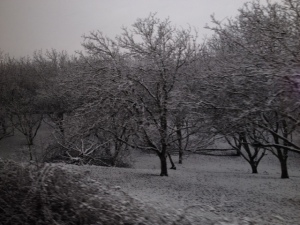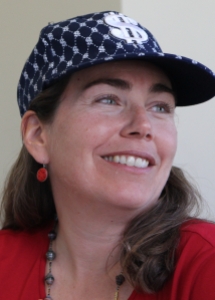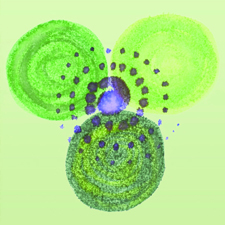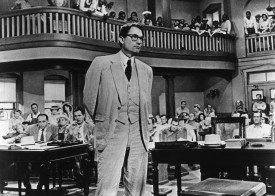 Atticus, To Kill a Mockingbird’s small town attorney, was one of my childhood heroes.
Atticus, To Kill a Mockingbird’s small town attorney, was one of my childhood heroes.
My girlfriends and I—white girls who rarely thought about race but considered prejudice ghastly—were deeply moved by Atticus. He was clear, inspiring and willing to stand against the racism of his Alabama neighbors.
We hadn’t noticed signs of racism around us in our white schools, churches and neighborhoods. I was glad that my family was respectful to our black maid, Mary, the only black person I knew.
We might have been polite, but none of us girls ever wondered why we carefully called all white adults by the formal Mr. or Mrs. followed by their last name yet referred to Mary by only her first name.
Oblivious to our contradictions, we distanced ourselves from the handful of openly racist students we noticed in our schools and believed that racism was on its way out.
In her recently published novel, Go Set a Watchman, Harper Lee paints a more complex—and more believable—picture of Atticus. And of us all. It is time to make room for a bigger, truer picture.
Atticus was a man of values who lived by the letter of the law. He had an unusual level of respect for all his neighbors, regardless of their behavior or skin color. In To Kill a Mockingbird, Atticus honorably defended Tom Robinson, an innocent black man. Unlike many of his neighbors, who believed that any black person accused by a white person was automatically guilty, Atticus stood on the side of truth.
Go Set a Watchman takes place in the mid-1950s, two decades after To Kill a Mockingbird. In the midst of a tense disagreement with his adult daughter Scout, Atticus asks, “Do you want your children going to a school that’s been dragged down to accommodate Negro children?” (page 246)
Scout snapped back about the low quality of her white school, but I focused on Atticus’s words and cringed at his racist assumption.
Unfortunately, some white people are still asking Atticus’ question today—people who would deny that they were tainted with racism.
My friend Sarah recently bought a home in Portland. The neighborhood school where her daughters will attend is 77% non-white (45% Latino, 17% Asian, 13% Black, 23% White and 2% Native American). Many of Sarah’s acquaintances and friends have responded with surprise that she would consider sending her children to school there. Unspoken, but implied, is that this is “a school dragged down to accommodate Latino, Asian and Black children.”
Schools were more integrated 40 years ago than they are today. Sarah’s children’s school is one of the few Portland schools with marked racial diversity. As a racially diverse elementary school, their classrooms will mirror the growing racial diversity of our nation. Children can learn their A, B C’s and also be exposed to a diversity of ethnicities, perspectives and cultures.
The issues, of course, are complex. The US has a long history of some public schools—more often in whiter and wealthier neighborhoods—getting better funding, staffing and parental time and financial support than schools in less white or affluent neighborhoods. Less affluent parents often work multiple jobs, have positions with limited job flexibility and have less money to invest in programs at their schools. Though the intelligence of the students may be equivalent, the opportunities diverge widely.
I remember being a mother of young children, and I worked hard to support their education. But any time my fight focused solely on what was academically best for my children and ignored the bigger picture, I actively perpetuated inequality and segregation.
The question for Atticus and for us today is not how to make sure our white, upper middle class children 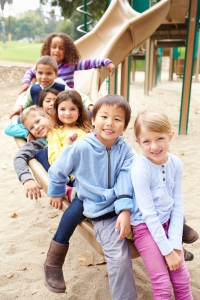 get the best possible education but how, together, all children get the best possible education.
get the best possible education but how, together, all children get the best possible education.
Go Set a Watchman sounds a critical warning for whites like me. We need to begin to notice racism and its impact on people of all races, including ourselves, and learn to distinguish when our racial bias is active and when it is not.
The race problem isn’t “over there across the tracks,” as I naively thought as a child. The problem is in the middle of society (including our public schools) and in the midst of our own minds. Moral outrage or a good personal conscience isn’t enough. All of our children, black and white and brown and…, are harmed by racial inequality.
Sarah’s daughters will grow up with a diversity of people I couldn’t have imagined as a young girl. In order to support her children’s thriving, Sarah was wise enough to know that she needed support and training* to hone her own skills for living values values that empower all people in the middle of a world, and a school system, that has been divided by race, gender, power and class.
Now is the moment for clear sight and honorable action as together we turn the tide toward justice and equity in our own hearts and in our nation. What does that look like for you?
*In college, Sarah used skills gleaned from the National Coalition Building Institute to present prejudice-reduction workshops for her peers. As she prepares for her oldest child to go to kindergarten, she is joining a Be Present Peer Led Support Group.



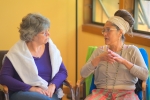
 er how often I try to turn away from working the money, my commitment to waking up to the big topics and experimenting with keeping my values in line with behavior keeps bringing me back to the money. And fundraising.
er how often I try to turn away from working the money, my commitment to waking up to the big topics and experimenting with keeping my values in line with behavior keeps bringing me back to the money. And fundraising.
